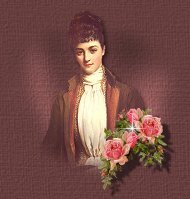|

| Horseback Riding in the 19th Century could be just as appealing to
young ladies as in our present day - with a bit more of a challenge! Riding sidesaddle or
"aside" as it was euphemized, is no easy feat! I can speak from
experience, having attempted this daunting venture at least twice and I have been riding
off and on since I was five. Granted, nowadays, women have the advantage of
riding astride; to me, a far more secure seat, although "aside" riders
DO
exist and some declare that sidesaddle is a far safer mode! Granted, it
IS
very elegant and charming and requires a great deal of motivation and skill.

|
| Be sure
to check out the World Sidesaddle Federation, Inc.
Their site is a wonderful
compilation of facts and history concerning the graceful art of riding "aside"
today as well as in the past! |
| Most
who could afford to ride were of more than moderate means, as maintaining a horse and
having a stylish habit fitted required more than a pittance. The horse, too, had to
usually be instructed in carrying a lady and there were many notices of animals being
described as a "lady's horse or pony"; usually docile and even tempered. |
| Held by
his groom, this elegantly stylish animal is ready for his mistress' morning ride. |
| Once
a lady decided that she wanted to ride, a fitting for a habit was required. One
simply did not ride in one's street or everyday clothes! During the 19th Century,
the habit, like most dress went through various changes; what was fashionable in one
decade became passe' in another. Nannie Power
O'Donoghue, a prominent
Irish horsewoman of the 1880's, wrote of the changing styles and prevelant tastes in
habits:
"For dusty roads a
black gauze veil will be found useful, but avoid as you would poison, every temptation to
wear even the faintest scrap of colour on horseback. All such atrocities as blue and
green veils have happily long since vanished, but, even still, a red bow, a gaudy flower
stuck in the buttonhole, and oh, horror of horrors! a pocket handkerchief appearing like a
miniature fomentation - these still occasionally shock the eyes of sensitive persons and
cause us to marvel at the wearer's bad taste." (1)
From the 1830's through the
early 1870's the skirt was full and flowing and although picturesque, could cause a danger
to both rider and horse. There were varied accounts of the skirts catching brush,
tree limbs and even entangling in the horses' legs which could cause some nasty and
sometimes, fatal spills. (2) Of course, one's habit
had to be no less than fashionable and ladies' magazines were full of plates
which usually contained one or two with a riding habit in it's description.
|
1849
Godey's Fashion Plate depicting
two styles of fashionable habits for young
ladies. |
This 1847 Godey's
Plate, although highly romanticized, shows the full, flowing skirt which could be as
dangerous as it was showy.
|
| Looking as if she
had just stepped out of a Godey Fashion Plate, this circa 1850's
equestrianne sports a fashionable habit, large watch and chain at her waist and
carries a gold handled crop. (Taken from an ambrotype) |
| As
the century progressed, so did the style of the habit. In the mid 1870's the skirt was
less full and apt to flow down to the horse's legs when the rider was seated.
Likewise, the habit itself became more taylored in appearance, eventually evolving into
the sidesaddle habit we know today. |
Young
woman from the early 1870's in
a habit with the still somewhat full
skirt and taylored bodice. She wears a "topper" and veil and surprisingly
what appears to be a petticoat! |
These two ladies,
from a mid-1870's
fashion plate are sporting the same style of
habit, however, the lady on the left
appears to also be wearing a petticoat.
|
| What
did ladies wear underneath? Although the ladies above appear to be sporting lovely
embroidered petticoats for some strange reason or another - more or less for photographic
or illustrative purposes, as it would be very difficult indeed if not virtually
impossible to get one's leg over the prommel horn in petticoats - it was considered proper
for a lady to wear chamois or soft leather breeches under her skirts! (3)
|
1875 Drawing showing
the position of a lady's legs while seated also reveals her chamois breeches!
No petticoat here. Notice that the saddle has a "Leaping Horn" or another
prommel horn projecting out over the leg in the stirrup iron as a security feature.
Although some 19th Century saddles had this fixture, most did not. Some from
the mid-century even sported a stirrup in the shape of a lady's slipper - most certainly a
safety hazard!
from
The Illustrated Book of the Horse, S. Sidney, 1875 |
|
Here the circa 1875 lady prepares to mount - notice the relative
slimness of
the skirt in contrast to those of a
decade earlier.
|
A
little gallant help never hurt! Here her companion assists with the mounting process
apparently in lieu of a mounting block. Such a liberty! Let us
suppose that they are surely married. |
Our fair
equestrianne trots away for her morning ride, correctly attired and smartly turned out.
from
The Illustrated Book of the Horse, S. Sidney, 1875 |
| For the
fashionable, a ride in the Park was a chance to socialize, see and be seen, as well as
being considered healthful exercise. |
|
Sources
and Notes:
(1) Collier, Gaydell M.,
"Aside or Astride? Change in Style of Women Riders",
Smithsonian Magazine, October 1979
pp. 141-142,
(2) Ibid., pp. 138-139
(3) Sidney, S., The Illustrated Book of the Horse
1875 (Reprint) Wilshire Book
Co., North Hollywood, CA, 1972,
Chapter XV "Hints To Amazones", pp. 315-348
|
All
the
above
from
All
The
Year
Round


|